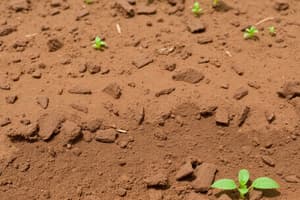Podcast
Questions and Answers
What is soil erosion primarily caused by?
What is soil erosion primarily caused by?
- The aging of soil
- High levels of rainfall
- Dynamic activity of erosive agents (correct)
- Chemical reactions in the soil
How can soil erosion occur at an alarming rate?
How can soil erosion occur at an alarming rate?
- Due to natural geological formations
- As a result of plant growth
- From stable weather conditions
- Through the active participation of humans (correct)
Which type of erosion is specifically caused by the movement of glaciers?
Which type of erosion is specifically caused by the movement of glaciers?
- Snow erosion
- Glacial erosion (correct)
- Wind erosion
- Water erosion
What is one of the potential consequences of soil erosion on farmland?
What is one of the potential consequences of soil erosion on farmland?
What is a potential geological consequence of soil erosion?
What is a potential geological consequence of soil erosion?
Who is believed to be the founder of Delhi?
Who is believed to be the founder of Delhi?
Which king defeated the Tomars and occupied Delhi in 1170?
Which king defeated the Tomars and occupied Delhi in 1170?
What was established in Delhi after the death of Muhammad Ghori in 1206?
What was established in Delhi after the death of Muhammad Ghori in 1206?
Which invader occupied Delhi in the year 1803?
Which invader occupied Delhi in the year 1803?
In which year did Delhi become the center of revolt during the significant uprising of 1857?
In which year did Delhi become the center of revolt during the significant uprising of 1857?
Flashcards are hidden until you start studying
Study Notes
Soil Erosion
- Soil erosion is the gradual wearing away of the top layer of soil.
- It is a type of soil degradation.
- The primary causes of soil erosion are natural agents like water, ice, wind, and animals.
- Human activities can also contribute to soil erosion, such as tillage.
- Erosion can be classified based on the agent responsible, including water, glacial, snow, wind, zoogenic, and anthropogenic erosion.
- Soil erosion can proceed slowly or rapidly, with significant effects on topsoil loss.
- Erosion can lead to decreased crop yields, poor water quality, damaged drainage systems, and even sinkholes.
Delhi's History
- Anangpal Tomar founded Delhi in the 11th century AD
- Delhi was called Dhilli or Dhillika in the Prithviraj Raso
- Delhi issued its own coins called dehaliwala
- The Chauhan king Vigrahraj defeated the Tomar in 1170 and took control of Delhi
- In 1192 AD, Ghori took control of Delhi after defeating the Chauhans
- Qutubuddin Aibak established the Slave Dynasty in Delhi after the death of Muhammad Ghori in 1206
- The rise of the Delhi Sultanate began in 1206
Delhi's Role in Indian History
- Delhi attracted many invaders due to its location and strategic importance
- Timur invaded Delhi in 1398
- Nadir Shah invaded Delhi in 1739
- Ahmad Shah Abdali invaded Delhi in 1759
- The British occupied Delhi in 1803
- Delhi was also the center of the 1857 revolt
Studying That Suits You
Use AI to generate personalized quizzes and flashcards to suit your learning preferences.



